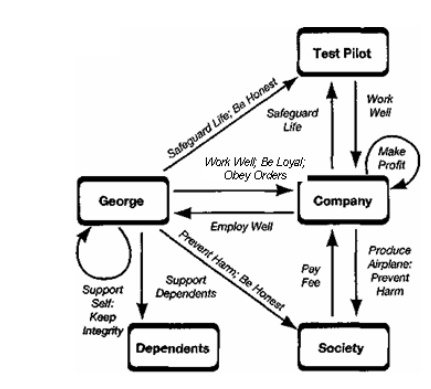Chapter: Professional Ethics in Engineering : Global Issues
Multinational Corporations with Neat Example
MULTINATIONAL CORPORATIONS WITH NEAT EXAMPLE:
Multinational corporations conduct extensive
business in more than one country. In some cases, their operations are spread
so thinly around the world that their official headquarters in any one home
country, as distinct from the additional host countries in which they do
business, is largely incidental and essentially a matter of historical
circumstance or of selection based on tax advantages.
The benefits to U.S. companies of doing
business in less economically developed countries are clear: inexpensive
labour, availability of natural resources, favourable tax arrangements, and
fresh markets for products. The benefits to the participants in developing
countries are equally clear: new jobs, jobs with higher pay and greater
challenge, transfer of advanced technology, and an array of social benefits
from sharing wealth. Yet moral challenges arise, accompanying business and
social complications. Who loses jobs at home when manufacturing is taken
―offshore‖? What does the host country lose in resources, control over its own
trade, and political independence? And what are the moral responsibilities of
corporations and individuals operating in less economically developed
countries? Here we focus on the last question. Before doing so it will be
helpful to introduce the concepts of technology transfer and appropriate
technology.

Technology Transfer and Appropriate Technology:
Technology transfer is the process of moving
technology to a novel setting and implementing it there. Technology includes
both hardware (machines and installations) and technique (technical,
organizational, and managerial skills and procedures). A novel setting is any
situation containing at least one new variable relevant to the success or
failure of a given technology.
The setting may be within a country where the
technology is already used elsewhere, or a foreign country, which is our
present interest. A variety of agents may conduct the transfer of echnology:
governments, universities, private volunteer organizations (such as Engineers
Without Borders), consulting firms, and multinational corporations. In most
instances, the transfer of technology from a familiar to a new environment is a
complex process. The technology being transferred may be one that originally
evolved over a period of time and is now being introduced as a ready-made,
completely new entity into a different setting. Discerning how the new setting
differs from familiar contexts requires the imaginative and cautious vision of
―cross-cultural social experimenters.‖ The
expression appropriate technology is widely used, but with a variety of
meanings.
We use it in a generic sense to refer to
identification, transfer, and implementation of the most suitable technology
for a new set of conditions. Typically the conditions include social factors
that go beyond routine economic and technical engineering constraints.
Identifying them requires attention to an array of human values and needs that
may influence how a technology affects the novel situation. Thus, in the words
of Peter Heller, ―appropriateness may be scrutinized in terms of scale,
technical and managerial skills, materials/energy (assured availability of
supply at reasonable cost), physical environment (temperature, humidity,
atmosphere, salinity, water availability, etc.), capital opportunity costs (to
be commensurate with benefits), but especially human values (acceptability of
the end-product by the intended users in light of their institutions,
traditions, beliefs, taboos, and what they consider the good life).‖5 Examples
include the introduction of agricultural machines and long-distance telephones.
A country with many poor farmers can make
better immediate use of small, single- or two-wheeled tractors that can serve
as motorized ploughs, to pull wagons or to drive pumps, than it can of huge
diesel tractors that require collectivized or agribusiness-style farming.
Conversely, the same country can benefit more from the latest in wireless
communication technology to spread its telephone service to more people and
over long distances than it can from old-fashioned transmission by wire.
Appropriate technology also implies that the technology should contribute to
and not detract from sustainable development of the host country by providing
for careful stewardship of its natural resources and not degrading the
environment beyond its carrying capacity. Nor should technology be used to
replace large numbers of individually tended small fields by large plantations
to grow crops for export, leaving most of the erstwhile farmers jobless and
without a source of home grown food.
The word appropriate is vague until we answer
the questions, appropriate to what, and in what way?6 Answering those questions
immediately invokes values about human needs and environmental protection, as
well as facts about situations, making it obvious that appropriate is a
value-laden term. In this broader sense, the appropriate technology might
sometimes be small-, intermediate-, or large-scale technology. Appropriate
technology is a generic concept that applies to all attempts to emphasize wider
social factors when transferring technologies. As such, it reinforces and
amplifies our view of engineering as social experimentation. With these
distinctions in mind, let us turn to a classic case study illustrating the
complexities of engineering within multinational settings.
Related Topics